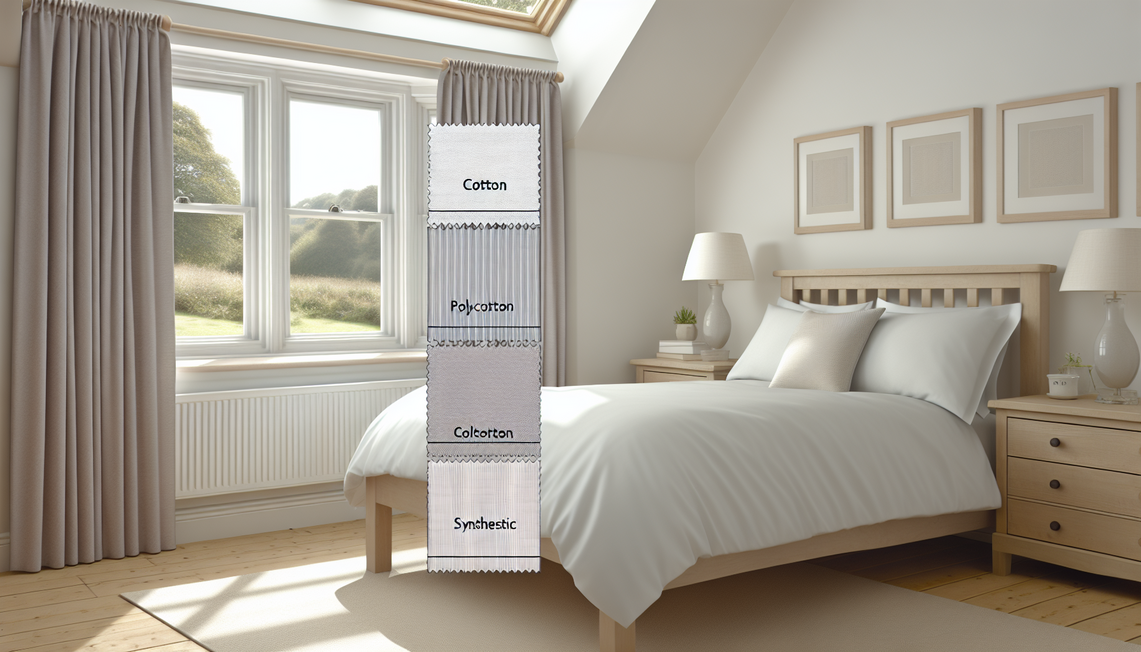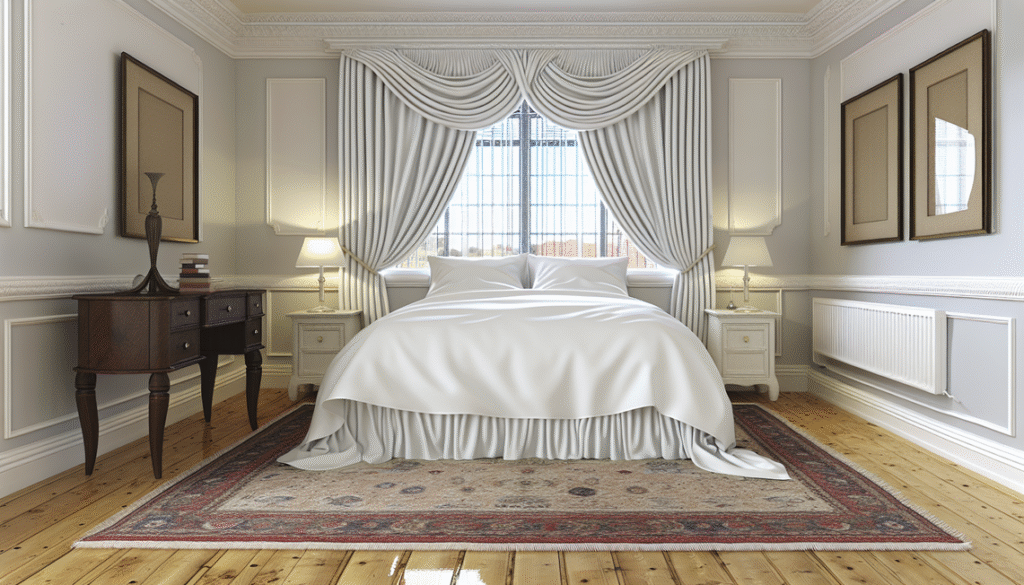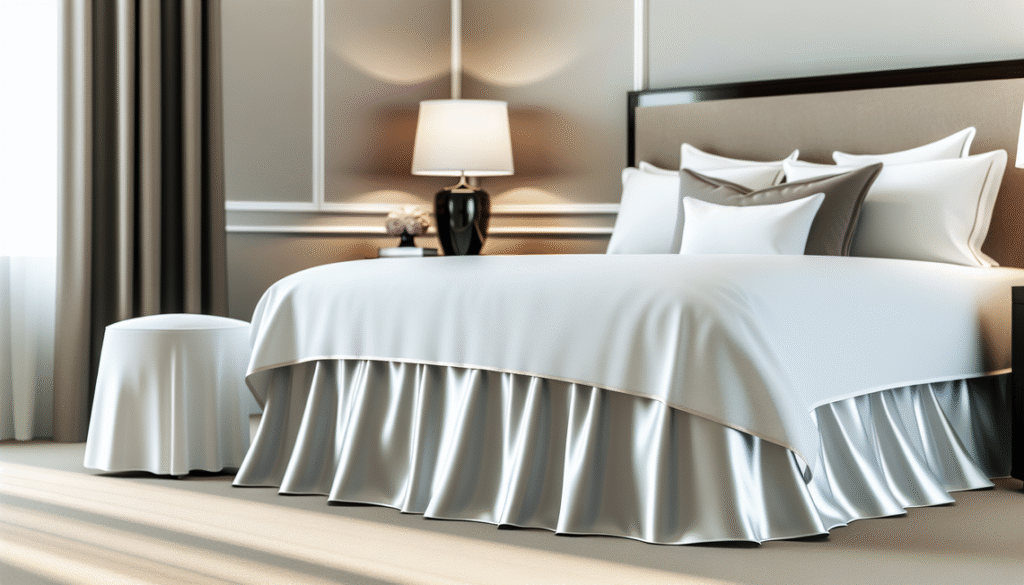Welcome to our comprehensive guide on selecting the perfect fitted valance sheet for your home. The right choice of bedding fabric can significantly influence your comfort, the longevity of your sheets, and the overall aesthetic of your bedroom. This guide delves into the characteristics of cotton, polycotton, and synthetic materials, helping you make an informed decision tailored to your preferences and lifestyle.
Understanding Valance Sheets: Definition, Purpose, and Benefits
A valance sheet is a specially designed fitted sheet that extends down the sides of a divan bed base, effectively covering and concealing the often unattractive or plain divan frames. Unlike a regular fitted sheet that simply wraps around the mattress, valance sheets provide a smooth, tailored look akin to a bed skirt, instantly enhancing bedroom aesthetics and creating a polished finish for your bed.
Beyond their decorative function, valance sheets serve practical purposes. They protect your bed base from dust, dirt, and potential damage, simplifying cleaning and maintenance of your bedding. The choice of valance sheet material directly influences the comfort, breathability, durability, and ease of care you experience. Selecting the right fabric not only ensures a sophisticated and neat appearance for your bed but also contributes to a pleasant and hygienic sleeping environment tailored to your lifestyle and the UK climate.
Cotton Valance Sheets: Natural Comfort and Breathability
Cotton remains a premier choice for valance sheets due to its natural fibres that offer exceptional softness and comfort. It’s a popular bedding fabric known for its luxurious feel and natural properties. Key characteristics of cotton valance sheets include:
- Breathability: Cotton excels at moisture absorption and air circulation, making it highly effective at regulating body temperature and reducing night sweats. This makes cotton sheets ideal for warm sleepers or for use during warmer UK months.
- Durability: High-quality cotton, especially long-staple varieties, sustains frequent washing without losing strength, softness, or structural integrity. With proper care, cotton valance sheets can last for many years.
- Natural Feel & Hypoallergenic Properties: Cotton is inherently soft, gentle on sensitive skin, and largely hypoallergenic, making it an excellent choice for individuals prone to allergies or skin irritations.
- Environmental Impact: As a renewable natural fibre, cotton is biodegradable. However, conventional cotton cultivation requires significant water and pesticide use, unless it is organically grown, which then offers a more eco-friendly bedding option.
Cotton valance sheets are ideal for those prioritizing natural comfort, superior breathability, and a soft touch, especially suited for moderate to warm UK climates where temperature regulation is key for a good night’s sleep.
Polycotton Valance Sheets: Balancing Comfort and Practicality
Polycotton is a widely popular blend of natural cotton and synthetic polyester fibres, engineered to combine the best qualities of both materials. This hybrid fabric offers a practical and versatile solution for bedding fabric choices, providing an excellent balance of comfort and utility for valance sheets:
- Affordability: Polycotton is typically more budget-friendly than 100% cotton, yet it still delivers a pleasing level of softness and comfort, offering great value for money.
- Wrinkle Resistance: The polyester content significantly reduces creasing and helps maintain a smoother, more crisp appearance after washing, minimising the need for ironing. This makes polycotton valance sheets excellent for a perpetually tidy look.
- Enhanced Durability: This blend offers superior strength and greater resistance to shrinking, fading, and tearing compared to pure cotton, leading to a longer lifespan.
- Easy Care: Polycotton sheets dry considerably faster than pure cotton and are generally easier to wash and maintain, making them a convenient choice for busy households in the UK.
Polycotton valance sheets strike a practical balance, making them perfect for everyday use, busy households, and anyone who desires the comfort of cotton with added resilience and easier maintenance. They are a versatile choice that performs well in diverse conditions.
Synthetic Valance Sheets: Durability and Easy Care Advantages
Synthetic fibres, primarily polyester, are used exclusively in some valance sheets to provide superior durability and exceptionally low maintenance. These bedding fabrics are engineered for performance and practicality. The key benefits of synthetic valance sheets include:
- High Durability: Synthetic materials are highly resistant to tearing, abrasion, and fading. This inherent strength means synthetic valance sheets often have a significantly longer functional lifespan, making them a cost-effective bedding option over time.
- Stain Resistance: Polyester is less prone to absorbing spills and stains compared to natural fibres, making it much easier to clean and maintain a pristine appearance.
- Quick Drying: Polyester dries remarkably rapidly, which significantly cuts down on laundry time and energy consumption, a major convenience for modern living.
- Cost-Effectiveness: Generally, synthetic valance sheets are the most budget-friendly option upfront, offering excellent durability for the price.
However, it is important to note that synthetic sheets typically lack the breathability of natural fibres like cotton. This can potentially cause discomfort during warm weather or for those prone to night sweating, as they may feel less cooling. They may also feel less soft and natural to the touch compared to cotton or polycotton, sometimes having a slightly slicker feel.
Comparing Cotton, Polycotton, and Synthetic Valance Sheet Materials Side-by-Side
This direct comparison table highlights the key features of each valance sheet material, enabling you to weigh your priorities between comfort, care requirements, budget, and sustainability. Understanding these differences is crucial for selecting the bedding fabric that best suits your needs and complements your bedroom aesthetic.
| Feature | Cotton | Polycotton | Synthetic (Polyester) |
|---|---|---|---|
| Comfort | Very soft, natural feel, highly breathable | Soft with slight synthetic feel, good breathability | Less soft, sometimes slick, poor breathability |
| Breathability | Excellent (absorbs moisture, regulates temperature) | Good (balance of cotton’s breathability and polyester’s durability) | Poor (can trap heat, less ideal for hot sleepers) |
| Durability | Durable but can show wear over time with frequent washing | Very durable, resistant to shrinking and fading | Highly durable, resistant to tearing, abrasion, and wrinkles |
| Wrinkle Resistance | Low (requires ironing for a crisp look) | Moderate to high (polyester content reduces creasing) | High (maintains a smooth appearance with minimal effort) |
| Maintenance | Requires careful washing to prevent shrinkage and maintain softness | Easy to wash, quick drying, less ironing required | Easy wash, very quick drying, highly stain resistant |
| Cost | Higher (due to natural fibre quality and processing) | Moderate (offers a good balance of features for the price) | Lowest (most budget-friendly option) |
| Environmental Impact | Biodegradable, but resource-heavy to produce (unless organic) | Less natural, blend impacts biodegradability | Synthetic, non-biodegradable, petroleum-based |
Choosing the Best Valance Sheet Material for UK Consumers: Practical Tips and Buying Advice
When selecting the perfect valance sheet material for your specific needs, it’s essential to consider several factors tailored for UK consumers and their unique preferences. Making an informed choice ensures your fitted valance sheet enhances both comfort and the visual appeal of your bedroom.
- Climate Considerations: The UK weather varies, but generally, breathable materials like cotton or polycotton blends work best to manage humidity and temperature fluctuations throughout the year, ensuring a comfortable sleep environment.
- Allergies and Sensitivities: If you or your family members are sensitive to allergens or have delicate skin, opting for 100% cotton is advisable due to its natural hypoallergenic properties.
- Budget Alignment: Polycotton offers a fantastic value blend of comfort, durability, and easy care without the premium price tag often associated with pure cotton sheets. Synthetic options are the most budget-friendly upfront.
- Maintenance Priorities: If low maintenance, quick drying, and wrinkle resistance are your top priorities, synthetic or polycotton valance sheets will be significantly more advantageous, saving you time and effort on laundry day.
- Aesthetic Compatibility: Ensure the colourfastness and fabric texture of your chosen valance sheet material complement your existing bedroom décor and overall style. Consider how the fabric drapes and its inherent sheen or matte finish.
- Purchase Location: Always buy from reputable UK retailers like RugStars. They offer a wide selection of fitted valance sheets with detailed material descriptions, accurate sizing suitable for UK divan beds, and clear care instructions.
By evaluating these considerations within your lifestyle context, you can confidently choose a valance sheet material that not only looks great but also meets your practical needs, contributing to a truly inviting and comfortable bedroom.
Expert Recommendations for Selecting Your Ideal Valance Sheet Material
To confidently select the most suitable valance sheet material for your home, consider these expert recommendations:
- Prioritise cotton valance sheets if you value natural softness, superior breathability, and skin-friendly fibres, especially for sensitive sleepers or those living in warmer areas of the UK.
- Opt for polycotton valance sheets if you seek a low-maintenance sheet that effectively balances comfort, durability, and affordability, making it an excellent all-rounder for everyday use.
- Choose synthetic valance sheets (polyester) when maximum durability, high stain resistance, and rapid drying are non-negotiable, and budget is a primary concern.
- Always check the fabric composition on product labels and verify that the dimensions precisely align with your bed base to ensure a perfect fit for your UK divan bed.
- Consider the washing instructions for each bedding fabric type and invest in quality brands for longevity and overall satisfaction.
- Explore the diverse options available at trusted UK retailers such as RugStars to find validated products tailored for UK bedding standards and to benefit from detailed product information.
Making an informed choice about your valance sheet material ensures your bedroom looks neat, inviting, and perfectly tailored to your comfort and practical needs year-round. A well-chosen valance sheet can significantly enhance your bed’s appearance and contribute to a more peaceful sleeping environment.
Frequently Asked Questions About Valance Sheet Materials
Here are some common questions to help you further understand and choose the best valance sheet material for your needs:
What is the best valance sheet material for hot sleepers?
For hot sleepers, 100% cotton is generally the best choice. Its natural fibres are highly breathable and excellent at wicking away moisture, helping to regulate body temperature and provide a cooler, more comfortable sleep environment. Polycotton offers a good balance if you need some durability, but pure cotton excels in breathability.
How do I care for my valance sheet based on its material?
Care instructions vary by material. Cotton valance sheets often require washing at moderate temperatures and may need ironing for a crisp finish. Polycotton sheets are typically easier to care for, being machine washable and quick-drying, often requiring less ironing due to their wrinkle resistance. Synthetic (polyester) valance sheets are the easiest to maintain, being very durable, quick-drying, and highly resistant to wrinkles and stains.
Are synthetic valance sheets suitable for people with allergies?
While synthetic materials like polyester are less prone to harbouring dust mites than natural fibres, they can sometimes cause irritation for very sensitive skin due to their non-natural feel or lack of breathability. For individuals with severe allergies or very sensitive skin, 100% cotton valance sheets are generally recommended due to their hypoallergenic properties and natural softness.
What is the primary difference between a fitted sheet and a valance sheet?
A fitted sheet is designed solely to cover and protect the mattress, fitting snugly around its sides. A valance sheet, on the other hand, also covers the mattress but extends further down to cover the entire divan bed base, reaching the floor, providing a decorative skirt-like appearance that conceals the bed frame underneath.
Can I use a valance sheet on any type of bed?
Valance sheets are specifically designed for divan beds, where the bed base is typically upholstered or plain and benefits from being concealed for aesthetic purposes. They fit over both the mattress and the base. While you can use a regular fitted sheet on any mattress, a valance sheet’s design is best suited for divan bases to achieve its intended decorative and concealing effect.



